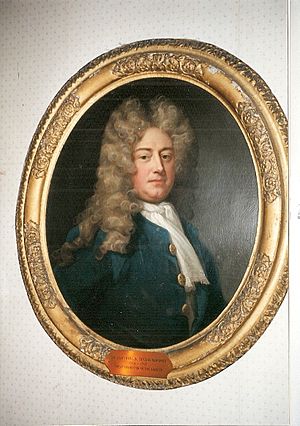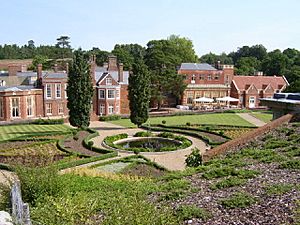Sir John Evelyn, 1st Baronet, of Wotton facts for kids
Sir John Evelyn, 1st Baronet (born 1682, died 1763) was an important British official and politician. He lived at Wotton in Surrey. He was a member of the House of Commons from 1708 to 1710. His famous grandfather, the diarist John Evelyn, taught him to think for himself in politics. He also encouraged John's love for books and learning. Sir John Evelyn held a big job as Postmaster-General from 1708 to 1715.
Contents
Early Life and Education
John Evelyn was born on March 1, 1682, in Deptford, Kent. He was the only son of John Evelyn the Younger and Martha Spencer. His father was a lawyer and a government official.
John went to several schools as a child. In 1689, he attended a French school in Greenwich. Later, he studied at Kings Street and then at Eton College from 1692 to 1698. When he was 16, he started studying at Balliol College, Oxford, in 1699. His father passed away that same year. This meant John would inherit the family estate at Wotton.
A Career in Government
Sir John Evelyn had a powerful helper named Sidney Godolphin. Godolphin was a close family friend and a very important government leader. He helped John get his first jobs in government.
- In 1703, John became the Receiver of stamp duties. This job involved collecting taxes on official papers.
- In 1705, he was made a Commissioner for prizes. This meant he helped manage goods captured during wars at sea.
On September 18, 1705, John married Anne Boscawen. She was Godolphin's niece, connecting him even more to this powerful family.
Becoming Postmaster General
In 1706, John inherited the Wotton estate after his grandfather, the famous diarist, passed away. In 1708, he gave up his other government jobs. He was then appointed as one of the two Postmasters General. This was a very important role, in charge of all mail services in Britain. He held this position until 1715.
His Time in Parliament
John Evelyn's grandfather had given him advice about politics. He told him to be honest and not just follow one political group. This made John's political views a bit hard to guess.
In 1705, he encouraged his family's tenants to vote for the Tory party. This was a protest against some unfair actions by a Whig politician. In 1708, he became a Member of Parliament for Helston. This area was mostly controlled by his Whig helper, Godolphin.
While in Parliament:
- He supported the Whigs in 1709 on a law about new settlers from Europe.
- In 1710, he voted to remove a religious leader, Dr. Sacheverell, from his position.
He did not run for Parliament again in the 1710 election. However, he managed to keep his job as Postmaster General. On August 6, 1713, he was given the special title of baronet of Wotton. This was a high honor from the King.
Later Career and Interests
After the Whig party took power in 1715, John lost his job at the Post Office. He tried to get back into Parliament in 1717 for Surrey, but he did not win.
However, in 1721, he gained the favor of another important leader, Robert Walpole. John was then appointed Commissioner of Customs. This job involved managing taxes on goods coming into the country. He held this position for a very long time, until 1763.
Sir John Evelyn spent much of his time improving his home, the Wotton estate. He also loved to study and learn. In 1723, he was chosen as a Fellow of the Royal Society. This is a group of top scientists and thinkers. At Wotton House, he built a large private library, 45 feet long. It held thousands of books collected by his family over many years.
Family and Legacy
Sir John Evelyn and his wife, Anne, had six sons and three daughters. Three of their sons and two of their daughters lived to adulthood. Anne passed away in 1752.
Sir John Evelyn died in July 1763. He was buried at Wotton. His oldest son, John, took over as the next Baronet. Another of his sons, William, also became a Member of Parliament for Helston. William later built a special monument to honor his parents.
Images for kids
 | Aurelia Browder |
 | Nannie Helen Burroughs |
 | Michelle Alexander |





